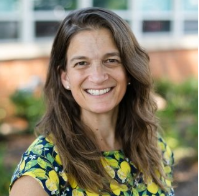Sara Rimm-Kaufman | Source | Commonwealth Professor of Education at University of Virginia

Sara Rimm-Kaufman
Over the past twenty years, Sara Rimm-Kaufman has led a dynamic team of researchers, project managers, post-docs, students, and staff toward an improved understanding of the systematic ways that classroom social and psychological experiences are productive (or not productive) environments for child and youth development. In doing so, her research considers the diversity present in schools, respects the challenges that teachers face every day, and recognizes the complexity of school improvement.
Rimm-Kaufman and her team have received numerous grants from the National Science Foundation, the Institute of Education Sciences, and private foundations (e.g., Carnegie, Templeton) and have authored more than 100 chapters, articles, blogs, and websites. She also serves in a research advisory capacity for the World Bank Group, EL Education, New Schools Venture Fund, and other organizations. She is a fellow of the American Psychological Association (Division 15) and American Psychological Science.
Rimm-Kaufman has co-directed the IES-funded Virginia Education Science Training (VEST) doctoral training program since 2004 and has directed the IES-funded VEST post-doctoral training program since 2008. She advises master's and doctoral students in the Educational Psychology–Applied Developmental Science program. In addition, she teaches undergraduate courses in learning and development, educational psychology, and social development.
-

University of Virginia (https://www.virginia.edu/)
Commonwealth Professor of Education -

University of Virginia (https://www.virginia.edu/)
Chair, Department of Education Leadership, Foundations and Policy
-
New Book Maps How Schools Can Successfully Support Students’ Social and Emotional Learning
Professor Rimm-Kaufman offers insights into how teachers and leaders can work together to effectively implement longstanding SEL practices in their schools.
Article -
Research: The Middle School Slump Is Real
In a first-of-its-kind study, researchers show several social and emotional competencies decrease during the middle school years and rebound in high school.
Article
-
“It is interesting that growth mindset is increasing while self-efficacy is decreasing,” Rimm-Kaufman said. “It's suggesting students believe they have an ability to be challenged and to grow intelligence. Self-efficacy is much more school oriented. Middle school students expressed not having as much confidence in their abilities to do things like earn As in their classes, do well on tests, master the hardest topic in their classes, or meet all the learning goals set by teachers.”
-
“I see how schools can harness the powerful relationships they have in the schools to address challenging situations that arise,” she said. “Above all, these schools and districts seem to value whole-child development and are not focused only on math and reading achievement at the expense of all else.”
-
“We want students to care about people and get along with them, including with people who are different than them. And we want kids to understand their emotions and learn how to manage them. Ultimately, SEL can help prepare kids for an increasingly uncertain world and teach them how to work with others to solve problems in ethical ways.”
